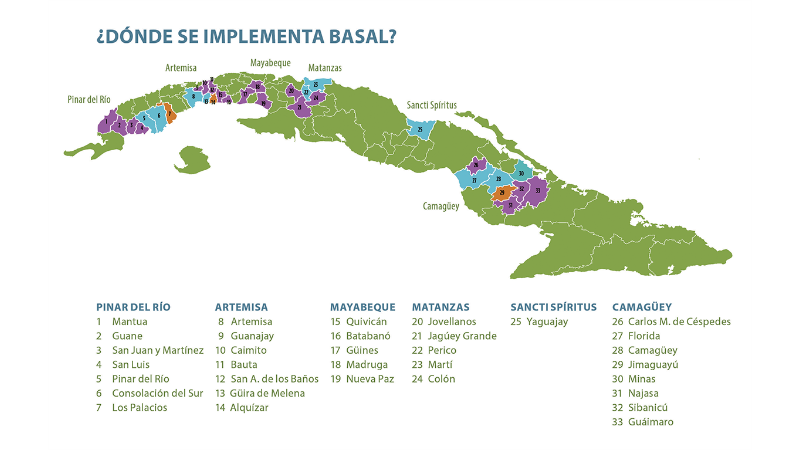Knowledge management for climate change adaptation. Experiences of the BASAL Project
Main Article Content
Abstract
Given its insular condition, Cuba is very vulnerable to climate change effects. Consequently, adaptation is a priority for the Government at all levels. Faced with this reality and scenarios, it is necessary to reduce climate change-related vulnerabilities. An important contribution has been achieved through the project Environmental Bases for Local Food Sustainability (BASAL), implemented by the Environment Agency of the Ministry of Science, Technology and Environment, the Ministry of Agriculture and the United Nations Development Program (UNDP), and financed by the European Union and the Swiss Development Cooperation (SDC). This project that has been implemented since 2013 in three municipalities (Los Palacios, Güira de Melena and Jimaguayú), includes among its objectives to extend its results to 33 municipalities, in 6 provinces of the country. This paper addresses the strategy outlined by the project for the replication and dissemination of knowledge, good practices and lessons learned, highlighting the need to publicize scientific results as quickly as possible, in a way that are understandable and applicable by the producers. Specific communication and visibility actions are proposed to improve information flow. Concrete actions are evaluated to improve information products and services and to establish a knowledge network on this topic. It is emphasized how the contribution of the results of an international project to national policies will help guarantee the sustainability of built capacities.
Article Details

This work is licensed under a Creative Commons Attribution-NonCommercial 4.0 International License.
References
BASAL. Estrategia Marco de Capacitación 2013-2017. 41 p.
BASAL. Estrategia de Intervención del Proyecto BASAL. Documento del Proyecto. pp. 12-24. Octubre 2012.
CEPAL. Agenda 2030 y los Objetivos de Desarrollo Sostenible Una oportunidad para América Latina y el Caribe. Santiago de Chile, 2016. 50 p.
Duarte, C. Medidas de Adaptación al Cambio Climático en entidades productivas beneficiadas del proyecto BASAL.
Balance de resultados e impactos de la aplicación medidas de adaptación al cambio climático en entidades productivas. Presentación Taller Nacional del proyecto Basal, abril, 2018.
Fernández Márquez, A. Experiencias en divulgación e información para el enfrentamiento al cambio en Cuba. Ponencia presentada en el Taller Regional “Involucrar a la sociedad frente al cambio climático: Experiencias de divulgación, participación social y fomento de la educación en la región iberoamericana”, Montevideo, Uruguay. 12-14 noviembre, 2017
Planos, E; T. Gutiérrez, R. Capote, G. Barranco, D. Salabarría y M. Vales. 2018. Aportes del Programa Nacional de Ciencia Cambio Climático en Cuba: Impactos, Adaptación y Mitigación. Agencia de Medio Ambiente. Editorial AMA. 61 p.
Pedroso Aguilar, W. La comunicación como proceso clave dentro de la Reducción de Riesgos de Desastres. Ponencia presentada en Taller Construyendo dimensiones e indicadores de vulnerabilidad desde las ciencias sociales para la reducción del riesgo de desastres y el enfrentamiento al cambio climático en Cuba. La Habana, Cuba, 24-26 octubre de 2018.
Roselló, T. Comunicación al día. Guía para implementar la Estrategia de Comunicación y Visibilidad de BASAL. Ed. R. Pérez y K. Cobarrubias. La Habana, Ed. AMA, 2014. 82 p.

